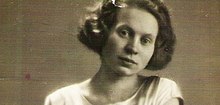Lūcija Garūta
| Lūcija Garūta | |
|---|---|
 |
|
| Born |
May 14, 1902 Rīga (now |
| Died | February 15, 1977 (aged 74) |
| Nationality | Latvian |
| Education | Latvian State Conservatory |
| Known for | Music |
Lūcija Garūta (born 14 May 1902, Riga, Russian Empire – died 15 February 1977, Riga, Latvian SSR) was a Latvian pianist, poet and composer.
Lūcija Garūta was born in Riga. From in 1919 to 1925, she studied at the Latvian Conservatory with professor Jāzeps Vītols for piano and others including Jānis Mediņš, and Jēkabs Kārkliņš. During her studies she was the pianist répétiteur at the Latvian National Opera.
After graduation, she worked at Riga Radio from 1925 to 1926. In 1926 she took a position teaching music theory and piano at the Jāzepa Mediņa School of Music. In 1926 she also continued her studies with Alfred Cortot, Isidor Philipp and Paul Le Flem, and in 1928 she studied composition with Paul Dukas at the Paris Ecole Normale de Musique. In 1926 she made her debut in Paris, and afterwards became active as a composer, holding concerts with singers , and , violinist Rūdolfs Miķelsons and cellist Atis Teihmanis. In 1939 she served on the Latvian music promotion association's board of directors. In the 1920s and 1930s, Lūcija Garūta was one of the most active pianists both as a soloist as well as accompanist, performing in Riga and in all of Latvia. Overall, Garūta performed with more than 100 musicians in chamber music concerts.
In 1940 Garūta took a position teaching composition and music theory at the Latvian Conservatory, where she was elected to professor in 1960. Illness ended her performing career, but she continued to teach. Lūcija Garūta died in 1977 and was buried at the 1st Riga Forest Cemetery.
Garūta's 1943 cantata Dievs, Tava zeme deg! (God, your land is burning!) is part of the Latvian Cultural Canon in music, recognized as one of the most important Latvian musical pieces of all time. A tape of its premiere on 15 March 1944 during World War II captured the sounds of battle outside of Riga Dom. The lyrics were written by for a contest themed "Latvian prayer to God." The premiere featured massed choirs conducted by while the composer played the Riga Cathedral pipe organ. The cantata was banned under Soviet control of Latvia and was revived in 1990 at the 20th Latvian Song Festival with over ten thousand singers.
...
Wikipedia
